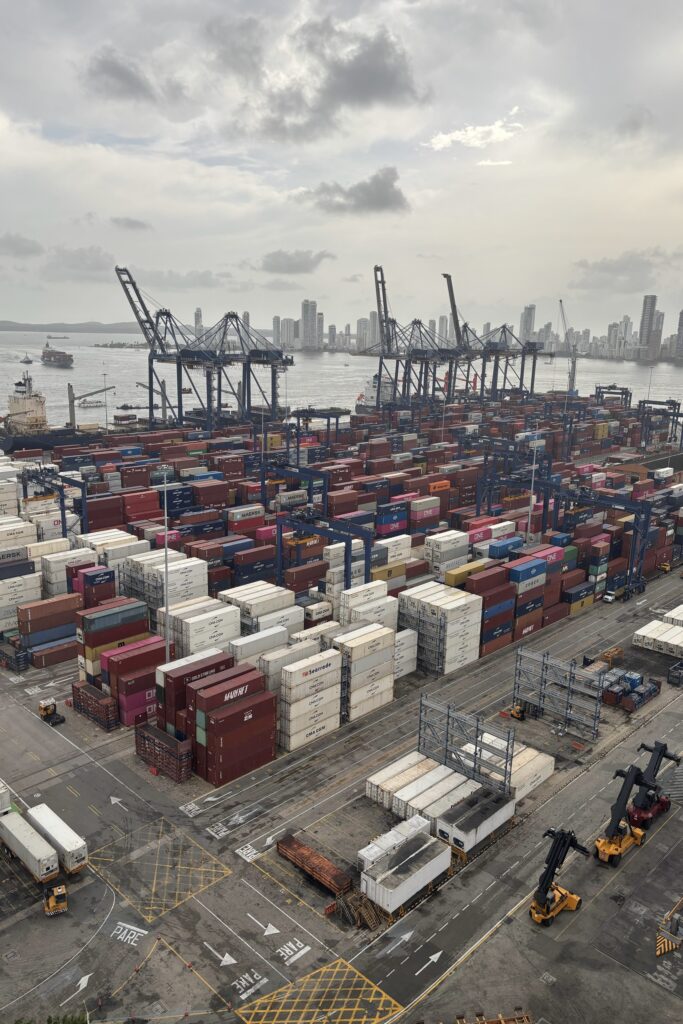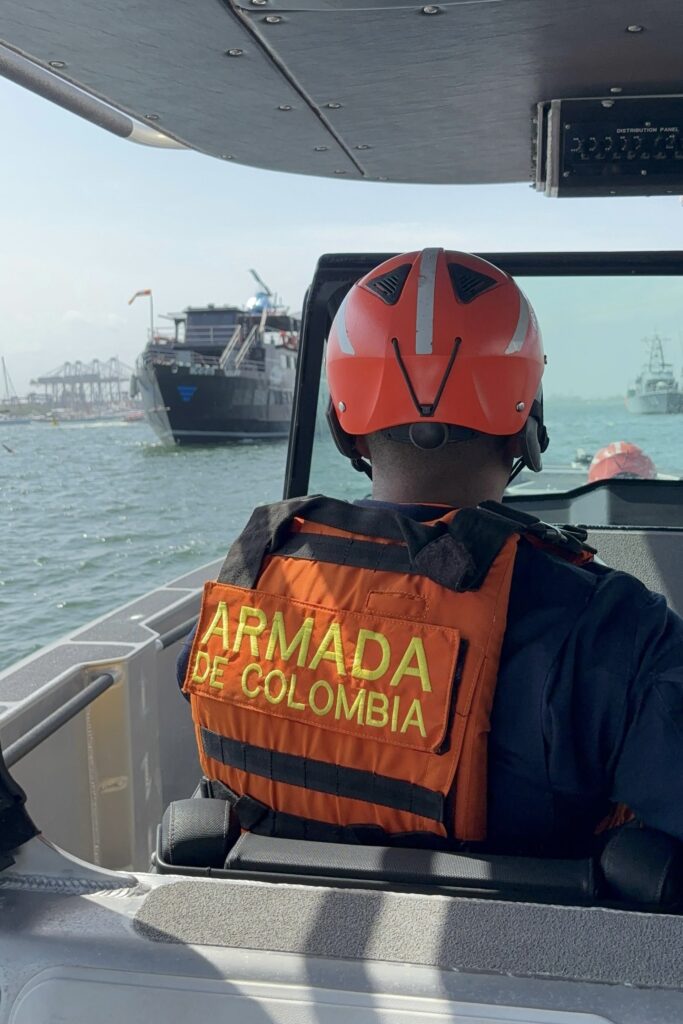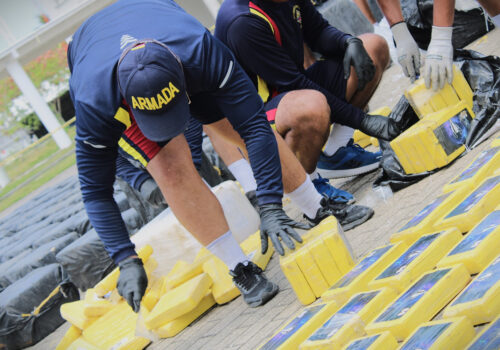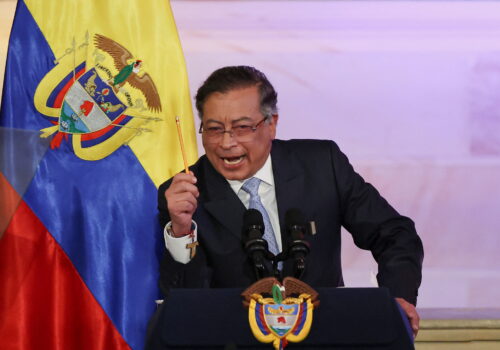Dispatch from Bogotá: This September is a pivotal moment for US-Colombia relations
BOGOTÁ, COLOMBIA—Greetings from a city where the coffee is strong, the altitude is unforgiving, and the countdown clock is ticking. The message from Colombian officials and US diplomats we have spoken with in recent days here was clear: The next month is going to be crucial for the US-Colombia relationship.
By mid-September, the White House has to decide whether to certify Colombia as a partner in the fight against transnational drug trafficking or to declare that it has “failed demonstrably” to make progress. If “decertification” happens—depending on the degree to which the White House seeks to limit the impact of the decision—then it could mark a major setback in the decadeslong relationship between the United States and perhaps its closest security partner in the region.
Coca crops skyrocketing in Colombia
Under US law, the White House must make an annual determination by September 15 as to whether major drug suppliers and transit nations are cooperating with Washington’s counternarcotics agenda. This year’s decision will set the tone for US-Colombia relations at a crucial moment in the relationship, when President Donald Trump is looking to take tougher action against drug trafficking in the Americas. In Colombia, the decision also coincides with an explosion of illicit coca crop cultivation in recent years, the proliferation of new armed groups, and the recent assassination of a presidential candidate that has many Colombians wondering if the country is reverting back to its worst years of drug-fueled violence.
According to the most recent figures from the United Nations Office on Drugs and Crime, Colombia’s potential cocaine production stood at roughly 2,700 metric tons in 2023, a 53 percent increase from the year before and more than double the figure in 2020. Upon taking office in 2022, President Gustavo Petro made big promises that he would shift toward a policy that emphasized crop substitution and providing economic opportunities in rural areas. However, the slow and uneven implementation of these programs has not even come close to keeping up with the scale of the problem. The lackluster pace of forced fumigation of coca crops, meanwhile, has also been a source of frustration in Washington. The Petro administration set a goal to target just thirty thousand hectares this year, which is only 20 percent of the last annual fumigation target set by the previous Duque administration.
Washington has options
Despite the dissatisfaction with Petro’s counternarcotics approach, decertification is not a given. Unmitigated decertification would, by law, automatically trigger a 50 percent reduction in US assistance, and it would put hundreds of millions of dollars’ worth of police and security cooperation programs supported by the United States at risk. It would also bind the United States to vote against projects in Colombia in multilateral development banks, such as the World Bank and the Inter-American Development Bank. It might also come with visa restrictions for top officials.
The last time Colombia was decertified, in 1996 under former President Ernesto Samper, the president’s visa to visit the United States was revoked and Colombia saw huge aid cuts and a major blow to its investment reputation. For this reason, many in the country’s private sector have warned against decertification even as Petro himself has often been hostile to business associations.
However, the United States could also opt for a more calibrated approach. The law allows for Trump to pair decertification with a national-interest waiver, which essentially argues that sanctions would impair US interests in spite of the lack of cooperation with US counternarcotics priorities. Trump could even issue targeted, program-specific waivers that allow continued support for critical counternarcotics operations and preserving strategic ties, while also allowing the White House to signal its discontent with the Petro administration. It could issue visa restrictions on Petro and those close to him, while maintaining the working relationship with Colombia’s security forces.


Bipartisan support for Colombia
With the US-Colombia relationship under heightened scrutiny in Washington, the Atlantic Council’s Adrienne Arsht Latin America Center is working to educate policymakers in Washington about the long history of this partnership and ensure that any decision on certification serves US geostrategic and security interests even amid tensions with Petro. For this reason, the center co-hosted a public event in Bogotá, Colombia, on August 15 with the National Business Association of Colombia featuring US senators Bernie Moreno (R-OH) and Ruben Gallego (D-AZ). In our conversation in Bogotá, the first Colombian-Americans elected to the US Senate emphasized US support for the relationship and highlighted opportunities to deepen cooperation on security, commerce, and investment. The symbolism of their joint appearance in Bogotá was not lost on the participants: Colombia continues to enjoy strong bipartisan support in Washington even at a time when their governments have significant disagreements.
The following week, the Atlantic Council led a bipartisan group of Senate and House staffers to Bogotá and Cartagena as part of our 2025 US-Colombia Congressional Fellowship. Over six days, the delegation engaged with US embassy officials, government ministers, senior military officers, civil society leaders, and private-sector representatives to gain a firsthand understanding of Colombia’s evolving security landscape, its economic and social outlook, and the geopolitical importance of the relationship.
In Bogotá, our delegation observed several US State Department–supported initiatives, such as Grupo Contra el Crimen Organizado, a multinational task force dedicated to combating illegal migration and organized crime through real-time intelligence sharing. Another initiative was the Narcotics Targeting Company, which supports Colombia’s anti-narcotics efforts by identifying and flagging suspect cargo in key ports for local authorities to inspect and take action in coordination with US partners.
In Cartagena, we visited the Caribbean Naval Force to observe the Colombian Navy’s seizure and interdiction capacity. The group crossed the Cartagena Bay on navy vessels, saw a training simulation on how officers are prepared to interdict vessels carrying narcotics, and was shown narco-subs captured by the Colombian armed forces. Senior officers emphasized the scale of their operations, noting that the Colombian Navy is among the leading naval forces in the world in terms of drug seizures. Intelligence sharing also emerged as a key theme, with discussions on how the Colombian Navy collaborates with US Southern Command and other international partners to interdict narcotics beyond Colombia’s maritime jurisdiction.
We also heard from port security officials breaking down ongoing efforts to protect supply chains, local government leaders laying out US-Colombia cooperation in infrastructure and development, and community leaders in the town of San Basilio de Palenque—the first free Black settlement in the Americas—explaining ongoing efforts to preserve Afro-Colombian heritage while addressing social and economic exclusion.
Taken together, these discussions made one thing clear: This is a pivotal moment for the US-Colombia relationship. What we heard repeatedly, from public, private, and community leaders alike, is that the decision around certification will carry implications across security cooperation, economic ties, and social inclusion. Though policy disagreements are front and center, our conversations also underscored that the relationship continues to enjoy strong, cross-sectoral backing. As Washington weighs its next steps, the question is not whether Colombia will remain one of the United States’ most important partners in the hemisphere—but how to recalibrate this partnership and strengthen it for the long run.
Geoff Ramsey is a senior fellow at the Atlantic Council’s Adrienne Arsht Latin America Center.
Isabella Palacios is a project assistant at the Atlantic Council’s Adrienne Arsht Latin America Center, where she contributes to the center’s work on Central America and Colombia.
Further reading
Thu, Aug 7, 2025
Five charts that show how criminal organizations in Colombia work—and grow
New Atlanticist By
Our experts break down the numbers that show the reach, power, and influence of drug cartels and other transnational criminal organizations.
Wed, Aug 6, 2025
How the US and Colombia can tackle crime, migration, and fallout from Venezuela’s crisis
Issue Brief By Lucie Kneip, Geoff Ramsey
Despite differences in priorities and political approaches, opportunities exist for the US and Colombia to coordinate policy that promotes stability in Venezuela and the broader region.
Tue, Sep 2, 2025
Take Colombia’s risk of democratic backsliding under Petro seriously
New Atlanticist By Enrique Millán-Mejía, Geoff Ramsey
Recent statements and proposals from Colombian President Gustavo Petro have raised concerns that his administration could spark a constitutional crisis.
Image: The Colombian flag at half-mast at the Casa de Nariño in Bogotá, Colombia, on August 12, 2025. REUTERS


